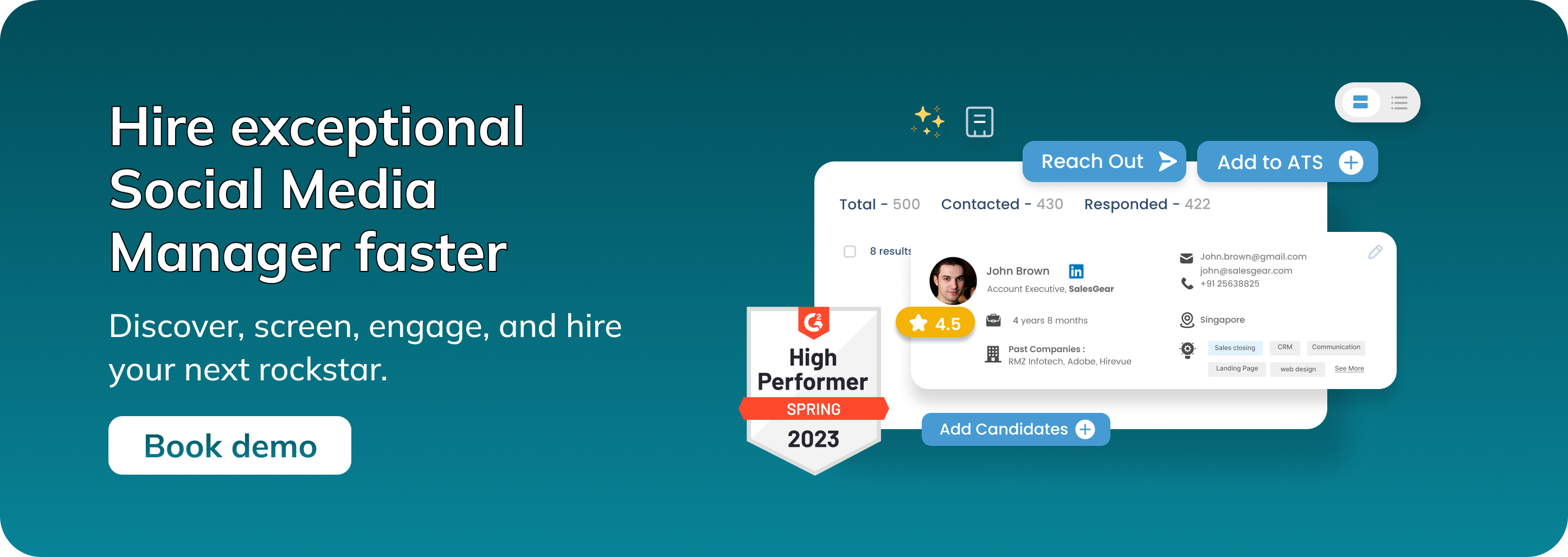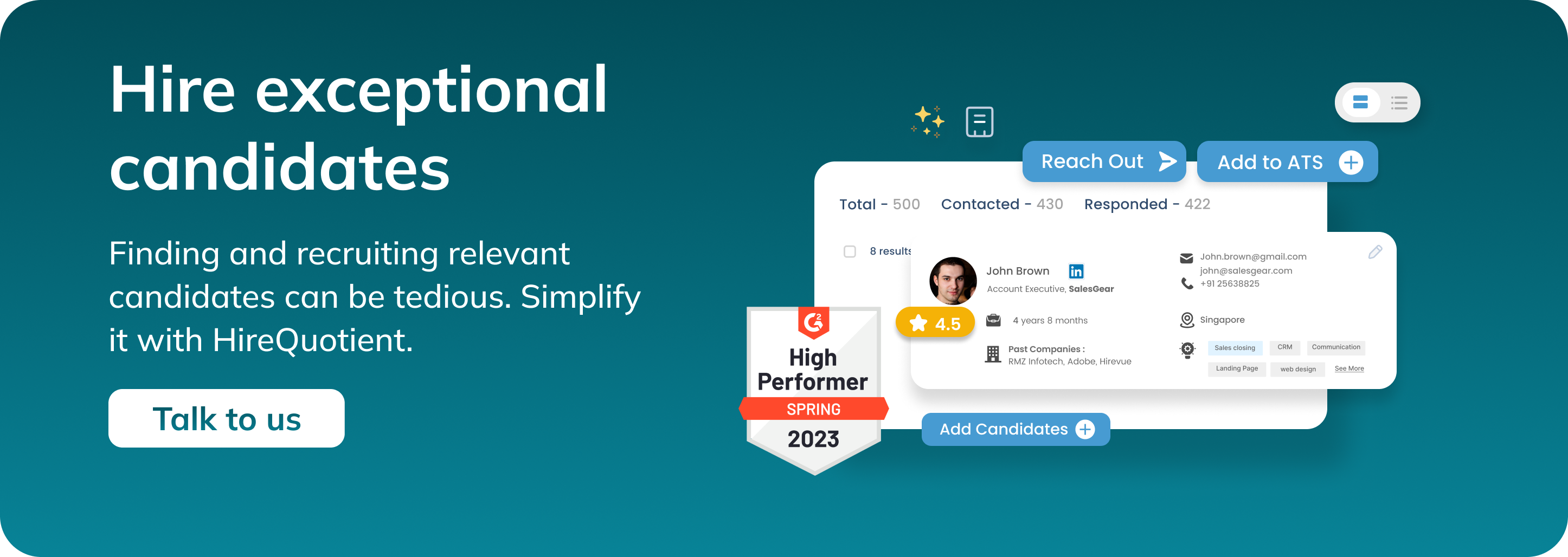Social Media Manager Interview Questions & Answers
Published on February 4th, 2024
In the digital age, the role of a Social Media Manager is pivotal in shaping a company's online presence and engagement strategies. Hiring the right candidate for this role requires a thorough understanding of their skills, experiences, and strategic thinking. Here, we present 10+ essential Social Media Manager interview questions and their corresponding answers, segmented for both fresher candidates and those with experience.
For Fresher Social Media Interview Questions:
1.Can you describe your understanding of different social media platforms and their unique functionalities?
Answer: As a fresher, I have extensively studied various social media platforms, including Facebook, Instagram, Twitter, LinkedIn, and YouTube. Each platform serves distinct purposes and demographics, and I am well-versed in tailoring content and strategies to align with platform-specific requirements.
2.How do you stay updated with the latest trends and changes in social media algorithms?
Answer: Despite being a fresher, I am proactive in staying abreast of emerging trends and algorithm changes through reputable industry blogs, webinars, and online courses. Additionally, I actively engage with social media communities and attend relevant workshops to enhance my knowledge continuously.
3. Can you share a social media campaign you conceptualized during your academic or internship experiences?
Answer: During my internship, I conceptualized a social media campaign aimed at promoting a local event. By leveraging engaging visuals, compelling copywriting, and strategic hashtag usage, we successfully increased event attendance by 30% and garnered substantial online engagement.
4. How do you handle negative feedback or comments on social media platforms?
Answer: Addressing negative feedback requires empathy, transparency, and prompt action. I believe in acknowledging the concerns publicly, offering a sincere apology if warranted, and directing the conversation to a private channel for resolution. Transparency and genuine engagement are key in turning negative experiences into positive outcomes.
5. Describe a time when you had to multitask and manage multiple social media channels simultaneously.
Answer: During my academic project, I was tasked with managing social media channels for a startup company. Despite the workload, I implemented a content calendar, scheduling tools, and performance metrics to streamline the process. By prioritizing tasks and maintaining open communication, I effectively managed multiple channels and ensured consistent engagement.
6. How do you measure the success of a social media campaign, and which metrics do you consider most important?
Answer: The success of a social media campaign is determined by various metrics, including reach, engagement, conversions, and ROI. I prioritize metrics such as engagement rate, click-through rate, conversion rate, and sentiment analysis to gauge the campaign's effectiveness and make data-driven decisions for optimization.
7. Can you explain the concept of social media content calendars and their importance in campaign management?
Answer: Social media content calendars serve as a roadmap for content creation, curation, and distribution across different platforms. They ensure consistency, alignment with marketing objectives, and timely delivery of content to the target audience. By meticulously planning and organizing content, social media managers can maintain brand identity and maximize audience engagement.
8. How do you approach community management and building brand advocates on social media?
Answer: Community management involves fostering meaningful interactions, addressing inquiries, and nurturing relationships with followers. I believe in actively engaging with the audience through comments, messages, and user-generated content, while also incentivizing participation and recognizing loyal advocates to amplify brand advocacy.
9. Can you discuss a successful influencer marketing collaboration you initiated or managed?
Answer: In my previous role, I collaborated with relevant influencers to promote a product launch campaign. By identifying influencers aligned with our brand values and target audience, negotiating mutually beneficial terms, and tracking campaign performance, we generated significant buzz, expanded reach, and drove conversions.
10. How do you adapt social media strategies to accommodate changes in audience behavior or platform algorithms?
Answer: Adapting to evolving audience behavior and platform algorithms requires agility, experimentation, and data analysis. I regularly conduct audience research, A/B testing, and performance audits to identify trends, refine strategies, and optimize content for maximum engagement and impact.
Mid-level social media interview questions
11. Can you describe your experience in developing and implementing social media strategies for different platforms?
Answer: As a mid-level Social Media Manager, I've had the opportunity to conceptualize and execute comprehensive social media strategies tailored to various platforms, including Facebook, Instagram, Twitter, LinkedIn, and YouTube. These strategies encompassed content planning, audience targeting, campaign management, and performance analysis to drive engagement and achieve organizational objectives.
12. How do you stay updated with the latest trends and changes in social media algorithms, and how do you integrate them into your strategies?
Answer: Remaining abreast of evolving trends and algorithm changes is essential in the dynamic realm of social media. I actively engage with industry publications, attend webinars, and participate in relevant online communities to stay informed. Integrating emerging trends and algorithm updates into our strategies ensures relevance, visibility, and optimal performance across platforms.
13. Share a successful social media campaign you spearheaded and the key strategies that contributed to its success.
Answer: In my previous role, I orchestrated a campaign centered around user-generated content, leveraging compelling visuals, interactive elements, and strategic calls-to-action to encourage audience participation. By fostering community engagement, amplifying user-generated content, and monitoring campaign metrics in real-time, we achieved a significant increase in brand visibility, engagement, and user-generated content submissions.
14. How do you approach content creation and curation to maintain a cohesive brand identity across different social media channels?
Answer: Consistency in brand messaging and identity is paramount in social media management. I adopt a strategic approach to content creation and curation, aligning each piece of content with the brand's values, tone, and aesthetics. By developing content calendars, adhering to style guidelines, and leveraging user-generated content, I ensure a cohesive brand presence that resonates with our target audience across all platforms.
15. Describe a time when you encountered a social media crisis and how you managed it effectively.
Answer: During a product launch campaign, we encountered negative feedback on social media regarding a perceived product flaw. To address the issue, I swiftly acknowledged the concerns, provided transparent updates on the resolution process, and directed affected customers to a dedicated support channel for assistance. By demonstrating empathy, accountability, and proactive communication, we successfully mitigated the crisis and restored customer trust and satisfaction.
16. How do you analyze social media metrics and insights to measure campaign performance and inform future strategies?
Answer: I employ a data-driven approach to social media analysis, leveraging platform analytics tools, third-party analytics software, and custom dashboards to monitor key performance indicators (KPIs) such as engagement rate, reach, impressions, conversion rate, and sentiment analysis. By extracting actionable insights from data, identifying trends, and iteratively optimizing strategies, we continuously enhance campaign effectiveness and achieve desired outcomes.
17. Can you discuss your experience with influencer marketing and how you identify, engage, and collaborate with influencers to amplify brand reach and engagement?
Answer: In my role, I've orchestrated successful influencer marketing campaigns by identifying influencers aligned with our brand values and target audience, establishing authentic relationships, and collaborating on mutually beneficial partnerships. By defining clear objectives, setting expectations, and tracking performance metrics, we've achieved impactful collaborations that resonate with our audience and drive meaningful engagement.
18. How do you foster community engagement and build brand advocacy on social media platforms?
Answer: Community engagement is integral to cultivating brand loyalty and advocacy. I prioritize active participation, meaningful interactions, and user-generated content initiatives to foster a sense of community and belonging among our audience. By recognizing and amplifying user contributions, addressing inquiries promptly, and fostering a supportive online environment, we nurture brand advocates who advocate for our brand organically.
19. Describe your approach to crisis management on social media platforms and how you maintain brand reputation during challenging situations.
Answer: During crises, transparency, responsiveness, and empathy are paramount. I establish clear communication protocols, designate crisis response teams, and develop pre-approved messaging templates to ensure swift and consistent communication across platforms. By actively monitoring conversations, addressing concerns proactively, and demonstrating accountability, we mitigate reputational risks and preserve brand integrity amidst challenging circumstances.
20. How do you collaborate with cross-functional teams, such as marketing, PR, and customer support, to align social media initiatives with overarching business objectives?
Answer: Collaboration with cross-functional teams is essential in ensuring alignment and synergy across all facets of the organization. I facilitate open communication, foster collaborative relationships, and participate in cross-departmental meetings to align social media initiatives with broader business objectives, share insights, and leverage collective expertise to drive strategic initiatives forward.
Senior Social Media interview questions
21. Can you discuss your experience in developing and implementing overarching social media strategies that align with broader business goals and objectives?
Answer: As a Senior-level Social Media Manager, I've spearheaded comprehensive social media strategies that integrate seamlessly with overarching business objectives. By conducting in-depth market research, defining clear KPIs, and collaborating with cross-functional teams, I've developed strategic frameworks that drive brand awareness, engagement, and conversions across all relevant platforms.
22. How do you navigate and adapt to evolving social media trends and emerging platforms to maintain a competitive edge in the digital landscape?
Answer: Remaining at the forefront of social media innovation is imperative for sustained success. I prioritize continuous learning, actively monitor emerging trends and platform updates, and conduct pilot programs to assess the viability of new features and functionalities. By experimenting with emerging platforms, leveraging beta programs, and soliciting feedback from industry thought leaders, I ensure our social media presence remains innovative and relevant.
23. Share a challenging social media campaign you led and how you overcame obstacles to achieve successful outcomes.
Answer: In a highly competitive market landscape, I orchestrated a multifaceted social media campaign aimed at repositioning our brand and driving market share growth. Despite encountering budget constraints and competitive pressures, I leveraged data-driven insights, agile optimization strategies, and strategic partnerships to amplify campaign reach, engagement, and conversion rates. By fostering cross-departmental collaboration and maintaining a solution-oriented mindset, we exceeded campaign objectives and solidified our market leadership position.
24. How do you integrate user-generated content (UGC) and influencer marketing initiatives into your social media strategies to enhance brand authenticity and engagement?
Answer: User-generated content and influencer collaborations are integral components of our social media ecosystem. I cultivate authentic relationships with brand advocates and influencers, empower our community to contribute meaningful content, and curate UGC that resonates with our audience's interests and aspirations. By incentivizing participation, acknowledging user contributions, and fostering a sense of belonging, we amplify brand advocacy and foster organic engagement.
25. Describe your approach to crisis communication and reputation management on social media platforms during high-stakes situations or negative publicity.
Answer: During crises, swift and transparent communication is paramount to safeguarding brand reputation and maintaining stakeholder trust. I establish crisis communication protocols, designate crisis response teams, and leverage social listening tools to monitor sentiment and identify potential issues proactively. By crafting empathetic messaging, addressing concerns promptly, and providing timely updates, we mitigate reputational risks and uphold brand integrity amidst challenging circumstances.
26. How do you measure the effectiveness and ROI of social media initiatives, and how do you leverage data insights to optimize future strategies?
Answer: Data-driven decision-making is central to optimizing social media performance and maximizing ROI. I utilize advanced analytics tools, custom dashboards, and attribution models to track KPIs, analyze campaign performance, and identify actionable insights. By conducting A/B testing, audience segmentation, and cohort analysis, we refine targeting parameters, optimize content formats, and allocate resources effectively to drive meaningful business outcomes.
27. Can you discuss your experience in leading and mentoring social media teams, and how do you foster professional development and growth within your team?
Answer: As a Senior-level Social Media Manager, I prioritize team development and mentorship to cultivate a high-performing and collaborative work environment. I provide ongoing coaching, constructive feedback, and opportunities for skill enhancement to empower team members to excel in their roles. By fostering a culture of continuous learning, celebrating achievements, and advocating for professional development initiatives, we cultivate a cohesive and motivated team that drives innovation and achieves collective success.
28. How do you stay abreast of changes in social media algorithms, policies, and best practices, and how do you ensure compliance with platform guidelines and regulations?
Answer: Staying informed about social media updates, platform policies, and regulatory changes is crucial to maintaining compliance and maximizing performance. I engage with industry publications, attend webinars and conferences, and participate in professional development programs to stay ahead of evolving trends and best practices. By collaborating with legal and compliance teams, conducting routine audits, and implementing governance frameworks, we ensure adherence to platform guidelines and mitigate regulatory risks.
29. Can you discuss your experience in managing social media advertising campaigns, optimizing ad spend, and driving measurable results in alignment with campaign objectives?
Answer: Social media advertising is an integral component of our marketing mix, and I've led numerous campaigns across various platforms to drive brand awareness, engagement, and conversions. By leveraging audience segmentation, targeting capabilities, and dynamic ad formats, we optimize ad placements, bids, and creative assets to maximize ROI and achieve campaign objectives. Through continuous performance analysis, real-time optimization, and attribution modeling, we refine targeting parameters, enhance ad relevance, and unlock incremental growth opportunities.
30. How do you foster brand advocacy and cultivate a loyal community of brand ambassadors and advocates on social media platforms?
Answer: Building brand advocacy requires nurturing authentic relationships, fostering meaningful interactions, and empowering our community to become brand advocates. I prioritize user-generated content, host interactive engagement initiatives, and facilitate user feedback mechanisms to amplify authentic brand storytelling and foster a sense of community. By recognizing and rewarding advocacy, amplifying user contributions, and fostering two-way dialogue, we cultivate a loyal community of brand ambassadors who champion our brand values and drive organic growth.
Authors

Pankaj Deshmukh
Pankaj Deshmukh is a digital marketing professional working with HireQuotient. He strongly believes in the never-ending process of learning and stays updated with the latest trends in order to produce valuable content.

Hire the best without stress
Ask us how
Never Miss The Updates
We cover all recruitment, talent analytics, L&D, DEI, pre-employment, candidate screening, and hiring tools. Join our force & subscribe now!
Stay On Top Of Everything In HR



